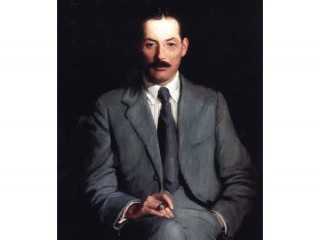
Edwin Arlington Robinson biography
Date of birth : 1869-12-22
Date of death : 1935-04-05
Birthplace : Head Tide, Maine
Nationality : American
Category : Famous Figures
Last modified : 2011-03-11
Credited as : Poet and playwright, Pulitzer Prize,
Edwin Arlington Robinson, American poet and playwright, was a leading literary figure of the early 20th century.
Edwin Arlington Robinson was born in Head Tide, Maine, on Dec. 22, 1869. He grew up in nearby Gardiner, which became the "Tilbury Town" of his poems. The story is told that for many months after his birth his parents called him "the baby" because they had not wanted a boy. The name "Edwin" was pulled from a hat by a stranger who happened to live in Arlington, Mass. Robinson hated his name, for it signified to him the accidental nature of man's fate. After studying at Harvard from 1891 to 1893, he returned to Gardiner.
Robinson published his first volume of poetry, The Torrent and the Night Before (1896), at his own expense. His early verse was largely ignored. In 1905 the struggling poet was presented with a way out of his oppressive poverty when President Theodore Roosevelt, who admired Captain Craig (1902), secured him a clerkship in the New York City Customs House. He resigned from this post in 1910 to devote himself to writing.
Eventually Robinson found a patron in Mrs. Edward MacDowell, who owned the MacDowell Colony in New Hampshire; here, from 1911, Robinson spent his summers. His talent was finally recognized with The Man against the Sky (1916). His prose dramas, Van Zorn (1914) and The Porcupine (1915), which anticipate in many ways the plays of T. S. Eliot, are virtually unknown today, yet they are possibly more worthwhile than many of his celebrated long poetic narratives, such as King Jasper (1935).
Robinson's late poetry was both symbolic and experimental, but his reputation chiefly rests on the austere, ironic "Tilbury Town" portraits, which express his feeling that all men are "children of the night" who find no star to guide them and get no answers to their questions. "Luke Havergal," "Cliff Klingenhagen," "George Crabbe," "Miniver Cheevy," "Richard Cory," "Reuben Bright," "Bewick Finzer," "Eros Turannos," and "Mr. Flood's Party" remain incisive explorations of early-20th-century despair.
Robinson won the Pulitzer Prize for poetry three times. He died in New York City on April 5, 1935.
















